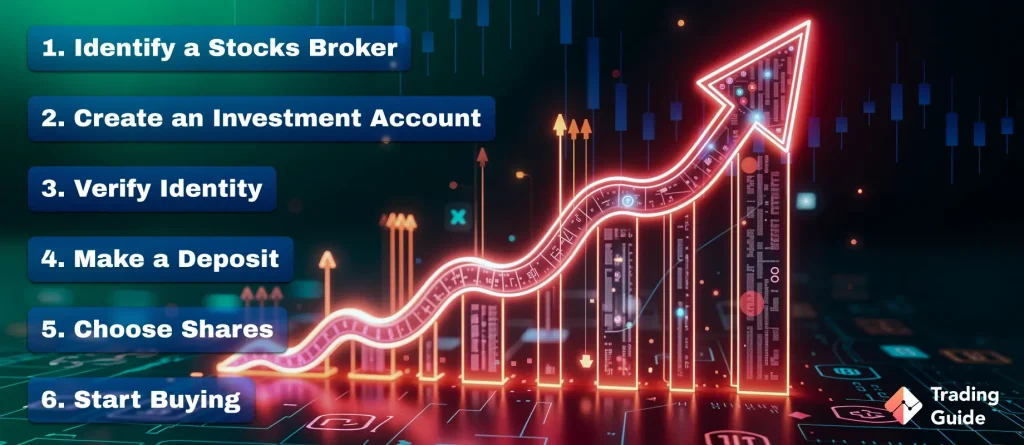Wondering how and where to buy shares in the UK financial market? Keep reading our ultimate guide.
Buying shares in the UK’s financial markets has now been made easy with online brokers. With only a few clicks on a broker’s platform, you can access the stock markets and sample the shares you feel are worth your investment.
We understand that the majority of share traders start investing without conducting the necessary due diligence. This is where everything begins to fall apart because, without the requisite knowledge, your chances of making it as a successful trader is minimal.
That is why we come in to help you through the learning process. Here, we will share with you the essential share trading tips, including the best way to successfully buy shares and how to find a suitable broker for share dealing.
What is a Share?

A share is a divided unit of a company’s value. It is also a unit of equity ownership in a company that exists as a financial asset, trust fund or mutual fund. This gives you direct ownership of a company’s distributed dividends.
The primary reason why companies offer shares is to raise money from investors (the general public). On the other hand, the investors will also buy shares if they see the potential of benefiting from the company’s success.
Note that when you buy a company’s share, you also acquire its part-ownership. This gives you the power to partake in the company’s decision making such as merging or acquisition decisions, voting for new directors, and more.
How to Buy Shares

Buying shares using an online broker is the best and easiest way to share trade. The broker connects you to companies that are listed in various stock exchanges globally, where you have plenty of shares to choose from. You can also let the broker buy shares for you.
The shares’ prices vary depending on the markets’ demand and supply. Therefore, it’s best to identify the right time to buy or sell your shares. Even if you have in mind the type of shares you want to invest in, you will still require a broker to trade.
Let’s dive straight into the step-by-step process of buying shares. Whether you want to invest in a company’s dividends stocks or penny shares, these steps will be of great assistance.
1. Identify a Stockbroker
Without the best stocks broker, it will be challenging to buy shares. Simply put, you need a reliable stocks broker that adheres to the stringent Financial Conduct Authority’s (FCA) regulations.
Such brokers usually have access to diverse stocks markets, which allows you to access multiple companies shares. The broker should also have a trading platform that you can easily manage your activities.
2. Create an Investment Account
After you’ve made your choice of the best broker, you need to create an investment account for you to buy shares. Creating an account comes with sharing some personal information, including your legal name, date of birth, nationality, physical address, email address, phone number, and national identification number.
During the account creating procedure, it’s recommended to have a user name and a strong password that secures your investment account.
Do not agonise about the safety of your details because most brokers are highly encrypted, thus protecting their system from hackers.
3. Verify Identity
All brokers in the UK require that you verify your identity. It is a crucial process that helps identify legal investors from illegal ones. Most traders simply take advantage of online brokers to launder money, which violates UK laws.
Verifying identity works by uploading your government identification card or drivers’ license. You will also be required to prove your physical address through a bank statement or a utility bill.
4. Make a Deposit
Once you receive a confirmation that your account has been verified, you are free to invest. However, you need to make a deposit to start investing. UK brokers have different minimum deposit requirements, so it is also wise to confirm this and see if it works within your budget.
Additionally, there are brokers that allow payments via different payments methods like brokers accepting credit cards, debit cards, bank transfers, and e-wallets.
5. Choose Shares
Now that you are fully ready to buy shares, nothing is stopping you. Identify the company with shares worth buying and prepare to make your purchase.
Since most UK stock brokers list hundreds of companies with shares to invest in, search the company you want and confirm the shares you want to buy.
6. Start Buying
With the shares now at your disposal, you will figure out how many you want to buy. This also means that you need to know how much you are willing to spend on those shares.
There are two ways that you can buy shares. Either through market order or limit order. With a market order, you will use your broker to buy the shares when the prices get to the next level.
On the other hand, limit orders let you set the actual price you are willing to buy particular shares. So if the prices are above your limit, you will have to wait for it to get where you expect to make the purchase.
You can find out How to buy Upwork shares in our other guides for beginners.
Holding Shares

After you have bought your shares, the next thing to do is hold them through your broker. The broker has no powers over your shares and will only make a move when you say so. When a broker maintains a position for you, you are likely to pay holding fees on a monthly or quarterly basis.
Buying shares means that you have gained part-ownership of the company. For as long as you are holding onto their shares, you have an entitlement to dividends. They should be able to send you statements about major company’s moves and paid dividends.
You cannot simply purchase shares and hold onto them without staying abreast with the company’s major turn of events. Any changes in the company’s operations could affect the shares’ prices hence impact your investment.
Selling Shares

Buying shares is easy, but have you ever thought about selling? At a trader, you buy shares so that you can sell them when the prices are favourable to earn profits.
The selling of shares procedure is also straightforward, just like buying, especially if you own an electronic share dealing certificate which is usually issued by the brokers.
By using the same broker that you bought shares from, you can also sell. The rate at which your investments are sold will depend on your shares’ liquidity. However, when it comes to stock CFDs, you can close your position at any time.
The best thing about selling shares through CFDs is that you are in charge of your activities. This allows you to apply risk management tools anytime, such as stop-loss and take profit orders.
How to Benefit from Share Investments
There are two ways that an investor can benefit from their shares investments. You can either apply the capital gains strategy or dividends. Let’s dive a little deep into what they are all about.
Capital Gains
You definitely invested in shares for profit gains, right? Well, you will have to wait until the prices go up to make a sale. The difference between the buying price and the selling price of a share multiplied by the number of shares bought is what we call capital gains.
You need to make sure that you are making the right moves to maximise your profits. Start by observing the market trends so that you can identify when the market price is at its highest to sell your shares.
Note: Sometimes, our investments don’t go as planned, and we end up making losses in the process.
Dividends
Another easy way to earn money with your shares investments is through dividends. Dividends are portions of a company’s profits that are usually distributed to shareholders on a quarterly basis.
If you own shares in that company, rest assured that you are also part of the dividend payment. The amount to receive will entirely depend on the company’s success and decisions made by the board of directors.
However, most companies do not pay dividends. Therefore, if you are planning to buy shares for dividends gain, conduct thorough research on the company you want to invest in.
Read about the dividend ETF in our other article.
Managing Risks when Buying Shares

Managing the risks involved in investing in shares is crucial for any investor. In share dealing, the typical way to manage the risks is through diversification.
Diversification lets you invest in multiple companies. Imagine you have bought many shares in a company that later on exits the business market. Your investments will also go down the drain.
That is why diversifying your portfolio in multiple companies is the way to go. Some companies’ shares will also keep reducing instead of rising, allowing you to benefit from other shares rather than being left empty-handed.
Note that investing in multiple companies has its own challenges, like incurring charges every time you share deal. Luckily, you can dodge this bullet by investing in the stock market index.
An index allows access to broader stock markets. Every index tracks a stock exchange market. Let’s look at some of the common index available in the stock exchange market.
The Financial Times Stock Exchange 100 (FTSE 100) index monitors the price performance of over 100 large companies in the London Stock Exchange. It is the best index if you plan to buy many shares on the London Stock Exchange.
Dow Jones global popularity is unmatched. This stock market index tracks the stocks price performance of 30 large companies listed on a stock exchange.
Like the FTSE 100, NASDAQ also tracks 100 large companies, but they should be listed on the NASDAQ stock market. Mostly, you will find popular firms dominated by this index, including Apple Inc and Amazon.
Another popular index is the S&P 500. It diversifies your portfolio even further compared to other indexes. It keeps track of the price performance of 500 large companies. Note that the companies should be based in the US and listed in NASDAQ and the New York Stocks Exchange.
How to Choose a Shares Investment Platform
Many share-dealing brokers are dominating the trading space, and this can cause confusion when choosing a suitable broker. While we also recommend the best share dealing platforms in the UK, we want to make sure that you will select a share dealing platform that meets your requirements.
The UK’s investment laws only allow you to invest with a broker regulated by the Financial Conduct Authority (FCA). Also, such brokers secure your trading funds and personal information.
You can either trade on a commission basis or using spreads. Therefore choose a platform with charges that favours your budget.
The shares listed on a broker’s platform is essential in diversifying your portfolio. Shares need to be plenty and listed on the world-renowned stock exchanges.
The majority of share dealing brokers have customer support services that are either available 5 or 7 days a week. Regardless of your trading schedule, make sure that the customer service is reliable and reachable across a wide range of channels, including phone, emails, or live chats.
Beginners usually find it challenging to dive straight in and start investing in the available markets. That is why most UK brokers, especially our referenced ones have demo accounts where you can practise and test drive a share dealing platform.
Short Stocks
Long trading is popular in share dealing. However, you can also short trade stocks, whereby you will simply speculate on the performance of a company’s stock prices. Ensure that you conduct thorough research to find the company stocks with decreasing value. It is one of the easiest and quick ways to make profits in the stocks market.
Short trading on stocks works by a trader borrowing stocks from their broker and sells them at lower prices. They will then repurchase those stocks at a much lower price and return them to the broker. In most cases, the broker will conduct the trade for you with your authorisation, of course.
Final Thoughts
While you have learnt how to buy shares, you have also learnt how to sell them. To jog up your mind a little, shares can either be sold as a number or value. Therefore know the markets you want to sell and see which strategy will be best for your investment.
Buying shares is a great way to build your nest egg. However, it is a long-term investment that requires at least five years before you decide to sell your shares. This can really pay off if you succeed with your strategy, but it can also go down the hill if you don’t strategise well.
Remember to diversify your portfolio with share dealings to avoid surprises such as a company going out of the market or shares losing value in the coming years. Managing your risks in share dealing can save you from losing a substantial amount of money.
Lastly and most importantly, use the necessary tools to choose a good broker. Refer to our share dealing platforms for the best ones in the industry. Share dealing with our recommended brokers will make your experience worthwhile.




The diversification point really hits home for me. Early in my trading journey, I got too confident and put nearly 40% of my portfolio into a single tech company that looked bulletproof on paper. When they missed earnings and the stock dropped 25% in a day, it was a brutal lesson. Now I spread my investments across at least 10-12 different companies in various sectors, and I sleep much better at night.